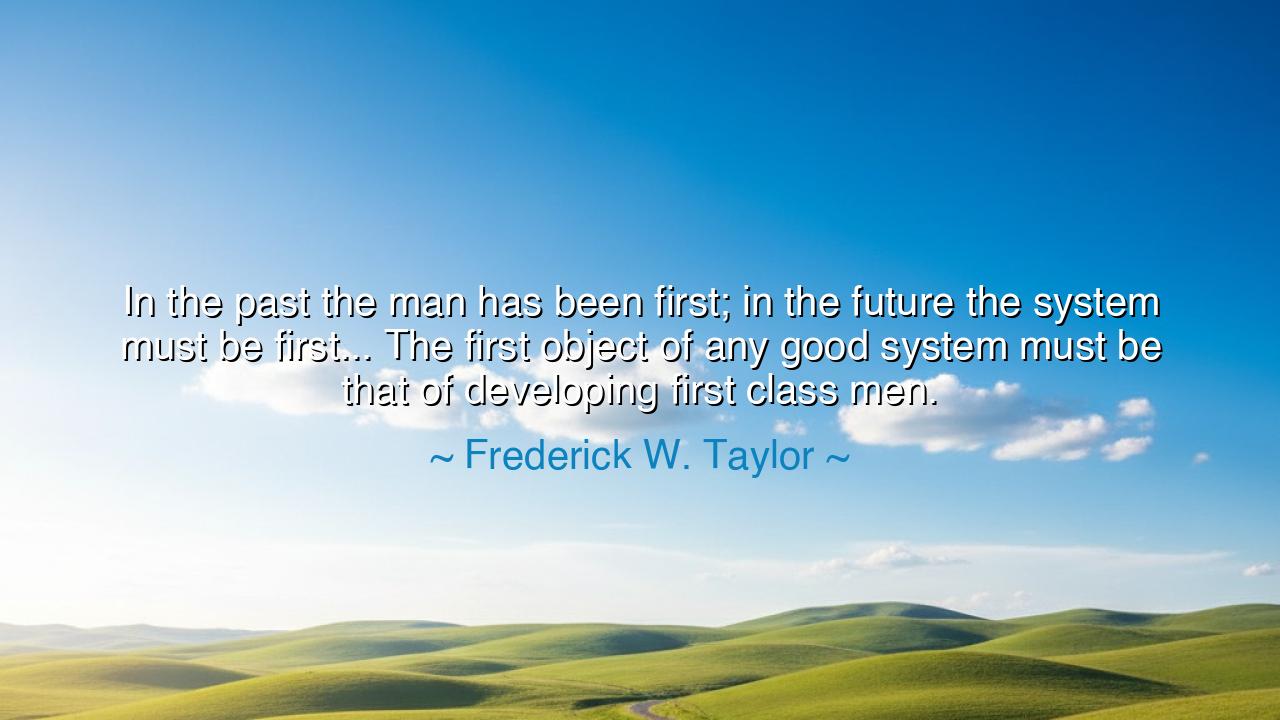
In the past the man has been first; in the future the system must
In the past the man has been first; in the future the system must be first... The first object of any good system must be that of developing first class men.






"In the past, the man has been first; in the future, the system must be first... The first object of any good system must be that of developing first-class men." These words from Frederick W. Taylor encapsulate a profound shift in how we view human potential and the role of organization in society. Taylor, often considered the father of scientific management, speaks here to the idea that as we move into the future, the system—the structure we create to organize our work, society, and institutions—must take precedence. However, he makes it clear that the purpose of any good system is not simply efficiency, but the development of people—the men and women who operate within it. This shift in thinking speaks to the greater good that can be achieved when systems are designed not just for productivity, but to cultivate the best in human potential.
In the ancient world, civilizations understood that their strength lay not only in their infrastructure or power but in the quality of the individuals who shaped their society. The Spartans placed the highest value on the training and development of their warriors, shaping them from a young age into leaders who could not only fight in battle but uphold the ideals of Spartan society. Their military system was a reflection of their belief that a strong system could only be built upon strong individuals, and vice versa. Yet, the Spartan model was harsh, built on discipline and physical prowess. What Taylor suggests is a more balanced approach—where the system is not merely a means of control, but a catalyst for growth, ensuring that the individuals within it reach their highest potential.
This philosophy of balance is reflected in the teachings of Confucius, whose vision for society was centered around the moral development of the individual within a larger system. Confucius emphasized that a good society is one in which individuals grow in virtue and wisdom, becoming better through their relationships with others and their role in the system. According to Confucian thought, the system of government, family, and community exists to nurture the personal development of its members, so that they can contribute to the well-being of the whole. In this way, Confucius would agree with Taylor's idea: the individual's development is inextricably tied to the system, and a strong system depends on the strength of the individuals within it.
Consider the example of the Roman Empire, which built some of the most sophisticated systems of governance, law, and engineering the world has ever seen. However, the empire's success was not just due to its systems—it was also a product of the men and women who led those systems. The Roman legions, for instance, were not only trained to fight; they were taught to think strategically, to lead with wisdom, and to embody the virtues of Roman society. The legions’ success in battle was a reflection of the strength and discipline of the men, but also of the system of training, leadership, and organization that supported them. This ancient example reinforces Taylor's point: the system enables the growth of first-class men who, in turn, strengthen the system.
The lesson we must take from Taylor’s quote is not merely about the creation of efficient systems, but the holistic development of individuals within those systems. It is a reminder that as we create organizations—whether in the workplace, in schools, or in society—we must design them with the aim of nurturing the human spirit, wisdom, and virtue. A system that only values productivity at the expense of personal growth will eventually stagnate. Systems must be built not just to optimize output, but to provide the resources, support, and education necessary for individuals to reach their highest potential. When the system works in harmony with the development of its people, it creates a cycle of growth and progress that benefits all.
In our own lives, we can apply this wisdom by designing our personal systems—whether in our careers, relationships, or self-development—that prioritize growth and development. As we engage with the world around us, we must consider how we can shape our environments to support our potential. This could mean creating routines that allow us to develop our skills, finding mentors who challenge us, or seeking opportunities to contribute to causes that align with our values. Taylor’s insight teaches us that while systems are necessary for achieving greatness, it is the individuals within those systems who ultimately drive the true progress.
Let us, then, recognize the power of systems—not only in the structures we build for work and society, but in the systems we create within ourselves. In our pursuit of success, we must be intentional about how we design our environment, ensuring that it supports not just efficiency, but growth. The system is a tool—a tool meant to nurture and develop the individual. As we work toward the future, let us remember that the highest purpose of any system is to bring out the best in each of us, for when we are empowered and developed, we build systems that elevate the entire world.






AAdministratorAdministrator
Welcome, honored guests. Please leave a comment, we will respond soon